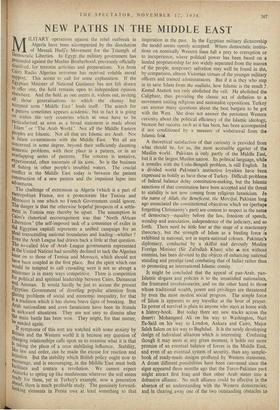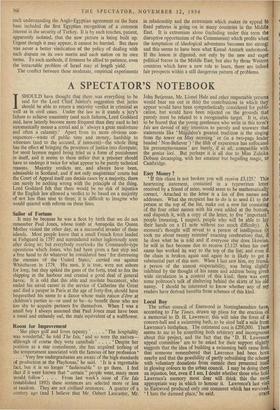NEW PATHS IN THE MIDDLE EAST
ILITARY operations against the rebel outbreak in Algeria have been aCcompanied by the dissolution of Messali Hadj's Movement for the Triumph of bemocratic Liberties. In Egypt ,the military government has Proceeded against the Muslim Brotherhood, previously officially dissolved, for terrorist activities and preparations. Yet from Cairo Radio Algerian terrorism has received voluble moral auPPort. This seems to call for some explanation. If the gYPtian Minister of National Guidance has not felt drawn to ofler one, the field remains open to independent opinion elsewhere. And the field, as one enters it, widens out, inviting all those generalisations to which the clumsy but accepted term 'Middle East' lends itself. The search for a pattern sometimes appears academic, but in fact it is going on within the, very countries which at once have to be Particularised as soon as a broad statement is made about Islam or 'The Arab World.' Not all the Middle Eastern Peoples are Islamic. Not all that are Islamic are Arab. Nor Is Islam co-terminous with the Middle East. Vet all are concerned in some degree. beyond their sufficiently daunting domestic problems, with their place in a pattern, or in an Overlapping series of patterns. The concern is tentative, experimental, often uncertain of its aims. So is the business of fishing in other people's troubled waters. The crucial conflict in the Middle East today is between the patient construction of a new pattern and the impatient lapse into adventures.
The challenge of extremism in Algeria (which is a part of laetropolitan France, not a protectorate like Tunisia and Lvtorocco) is one which no French Government could ignore. Ile danger is that the otherwise hopeful prospects of a settle- ra,„ent in Tunisia may thereby be upset. The assumption in Cairo's rhetorical encouragement was that 'North African Liberation' (the self-imposed task of a committee of exiles in P16 Egyptian capital) represents a unified campaign for an deal transcending national boundaries and leading—whither ?
ven the Arab League had drawn back a little at that question. 1111,C so-called bloc of\Arab League governments represented lathe United Nations had sensibly declined to tack the Algerian tssoe on to those of Tunisia and Morocco, which should not nave been coupled in the first place. But the spirit which one Would be tempted to call crusading were it not so abrupt a talsoomer is in many ways competitive. There is competition for political and spiritual leadership between Cairo, Damascus and Amman. It would hardly be just to accuse the present g)'ptian Government of diverting popular attention from raring problems of social and economjc inequality, for that Is tradition which it has shown brave signs of breaking. But thrill) nationalism and even fanaticism have been its friends awkward situations. They are not easy to dismiss after tA main battle has been won. They might, for that matter, na needed again. If symptoms of this sort are watched with some anxiety by uritain and the Western' world it is because any question of Ilanging relationships calls upon us to examine what it is that taking the place of a once stabilising influence. Stability, !Ike law and order, can be made the excuse for reaction and _Injustice. But the stability which British policy ought now to 1flcourage, and is encouraging, in the Middle East must both .acilitate and contain a revolution. We cannot expect cttaturks to spring up like mushrooms wherever the soil seems eadY for them, yet in Turkey's example, now a generation !head, there is much profitable study. The genuinely forward- looking elements in Persia owe at least something to that inspiration in the past. In the Egyptian military dictatorship the model seems openly accepted. Where democratic institu- tions on nominally Western lines fall a prey to corruption or to inexperience, where political power has been based on a landed proprietorship far too widely separated from the masses of the people, temporary salvation may well be found in the, by comparison, almost Victorian virtues of the younger military officers and trained administrators. But if it is they who' step in to save Islam from the mullahs, how Islamic is the result ? Kemal Ataturk not only abolished the veil. He abolished the Caliphate, thus providing the classic act of deflation to a movement uniting religious and nationalist oppositions. Turkey can answer many questions about the best bargain to be got with the West. She does not answer the persistent Western curiosity about the political efficiency of the Islamic ideology, because her success, such as it has been, has been accompanied if not conditioned by a measure of withdrawal from the Islamic foli.
A theoretical satisfaction of that curiosity is provided from what should be, for us, the most accessible quarter of the Muslim World. Pakistan is only partly of the Middle East, but it is the largest Muslim nation. Its political language, while it wrestles with the Urdu-Bengali problem, is still English. In a divided world Pakistan's instinctive loyalties have been expressed as boldly as have those of Turkey. Difficult problems ' of federal balance delay constitution-making, but the Islamic sanctions of that constitution have been accepted and the threat to stability is not now coming from religious fanaticism. In the name of Allah, the Beneficent, the Merciful, Pakistan long ago enunciated the constitutional objectives which we (perhaps forgetting Christianity's part) are content to respect in the name of democracy—equality before the law, freedom of speech. worship and association, independence of the judiciary, and so forth. There need be little fear at this stage of a reactionary theocracy, but the strength of Islam as a binding force is exhibited in national, not in supra-national colours. Pakistan's diplomacy, conducted by a skilful and devoutly Muslim Foreign Minister (Sir Zafrullah Khan) who ho.. not without enemies, has been devoted to the objects of enhancing national standing and prestige (and combating that of India) rather than to promoting an international Islamic comity.
It might be concluded that the appeal of pan-Arab, pan- Islamic slogans and policies is to the unsatisfied nationalists, the frustrated revolutionaries, and on the other hand to those whose traditional wealth, power and privileges are threatened by even the most modest social progress. The simple force of Islam is apparent to any traveller at the hour of prayer.
Its power of survival is plain to anyone who stays at home with a history-book. But today there are new tracks across the desert: Mohammed Ali on his way to Washington, Nuni Es-Said on his way to London, Ankara and Cairo, Major Saleh Salem on his way to Baghdad. It is the newly developing design of individual alliances which is interesting. Confusing though it may seem at any given moment, it holds out more promise of an eventual balance of forces in the Middle East, and even of an eventual system of security, than any sample- book of ready-made designs proffered by Western statesmen.
A dozen different possibilities have been canvassed since the signs appeared three months ago that the Turco-Pakistan pact might attract first Iraq and then other Arab states into a defensive alliance. No such alliance could be effective in the absence of an understanding with the Western democracies; and in clearing, away one of the two outstanding obstacles to such understanding the Anglo-Egyptian agreement on the Suez base included the first Egyptian recognition of a common interest in the security of Turkey. It is by such touches, patient, apparently isolated, that the new picture is being built up. Urgent though it may appear, it cannot be hurried. But there was never a better vindication of the policy of dealing with each dispute on its own merits and each nation on its own terms. To such methods, if firmness be allied to patience, even the intractable problem of Israel may at length yield.
The conflict between these moderate, empirical experiments in relationship and the extremism which makes its appeal to fixed patterns is going on in many countries in the Middle East. It is extremism alone (including under this term the disruptive opportunism of the Communists) which profits when the temptation of ideological adventures becomes too strong; and this seems to have been what Kemal Ataturk understood. If the lesson is digested, not only by the new and eager political forces in the Middle East, but also by those Western countries which have a new role to learn, there are indeed fair prospects within a still dangerous pattern of problems.



































 Previous page
Previous page